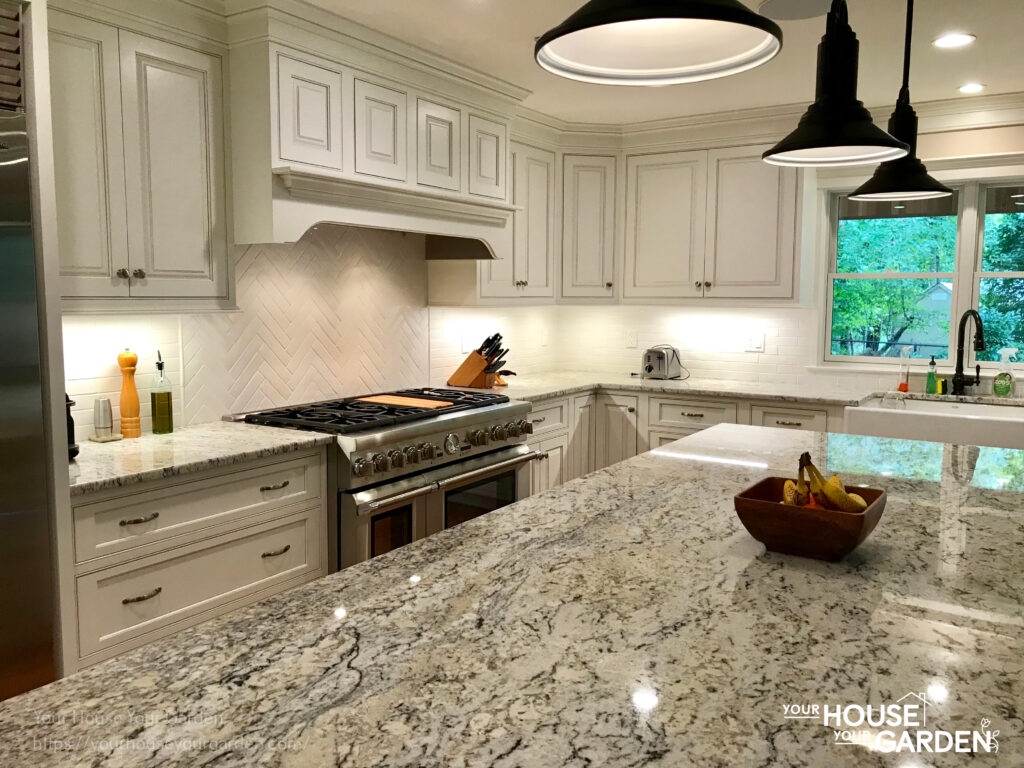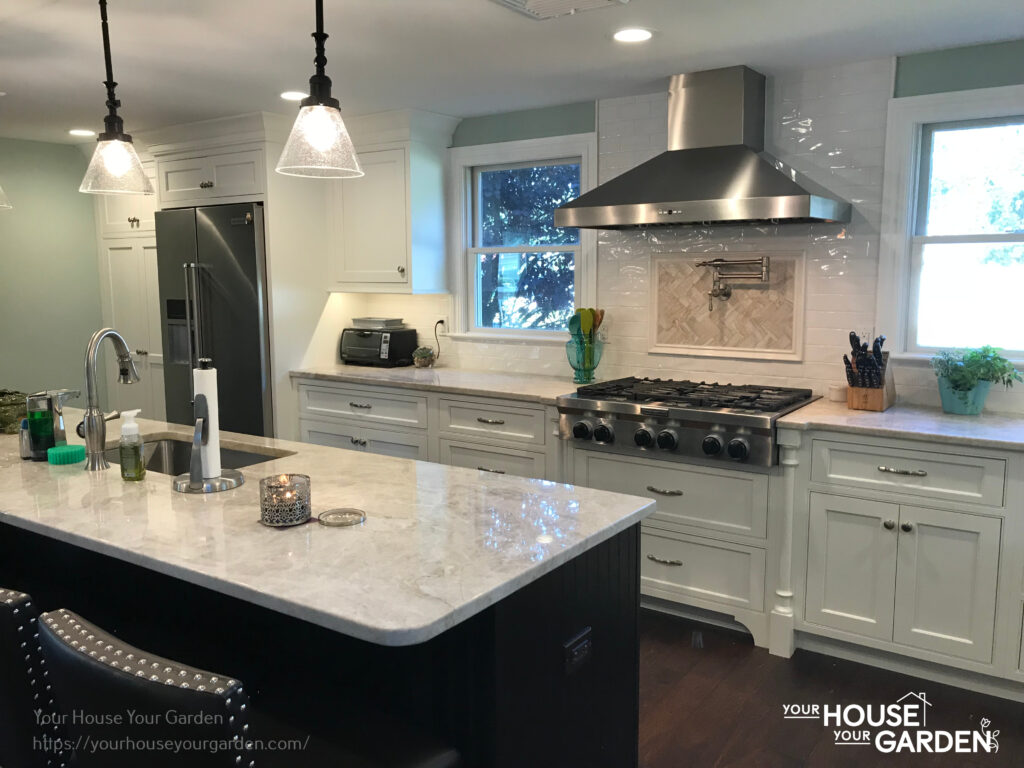Quartz vs Granite Countertops
Home » Home Remodeling » Kitchen Countertops » Quartz vs Granite Countertops
After narrowing down the materials that you want to use in your kitchen or bathroom, you may have been left with the popular choices: quartz vs granite. You may be thinking of simply browning through samples and seeing what matches your kitchen cabinets or backsplash better. However, we want you to make the best decision possible for your space so here’s our guide to getting to know the two countertop options.
Quartz vs Granite: The Difference
What is Quartz?
Natural quartz may be the second most abundant mineral on the earth but quartz countertops are an engineered product made out of crushed quartz, polymer resins, and other minerals depending on your personal preference. Also called engineered stone countertops, quartz countertops are composed of 90% to 95% of quartz and 5% to 10% resin. Engineered quartz is known for its natural look, non-porous nature, and various colorways that can even resemble granite.
What is Granite?
Granite is a mined natural stone that is composed of minerals like feldspar, quartz, and mica which make up the different colors you see per square foot. This natural material is typically cut into large slabs for kitchen countertops and is known for its heat-resistant, porous surface. Like other natural materials, granite slabs require sealing but after installation, a granite countertop is low-maintenance because it is scratch and stain-resistant.
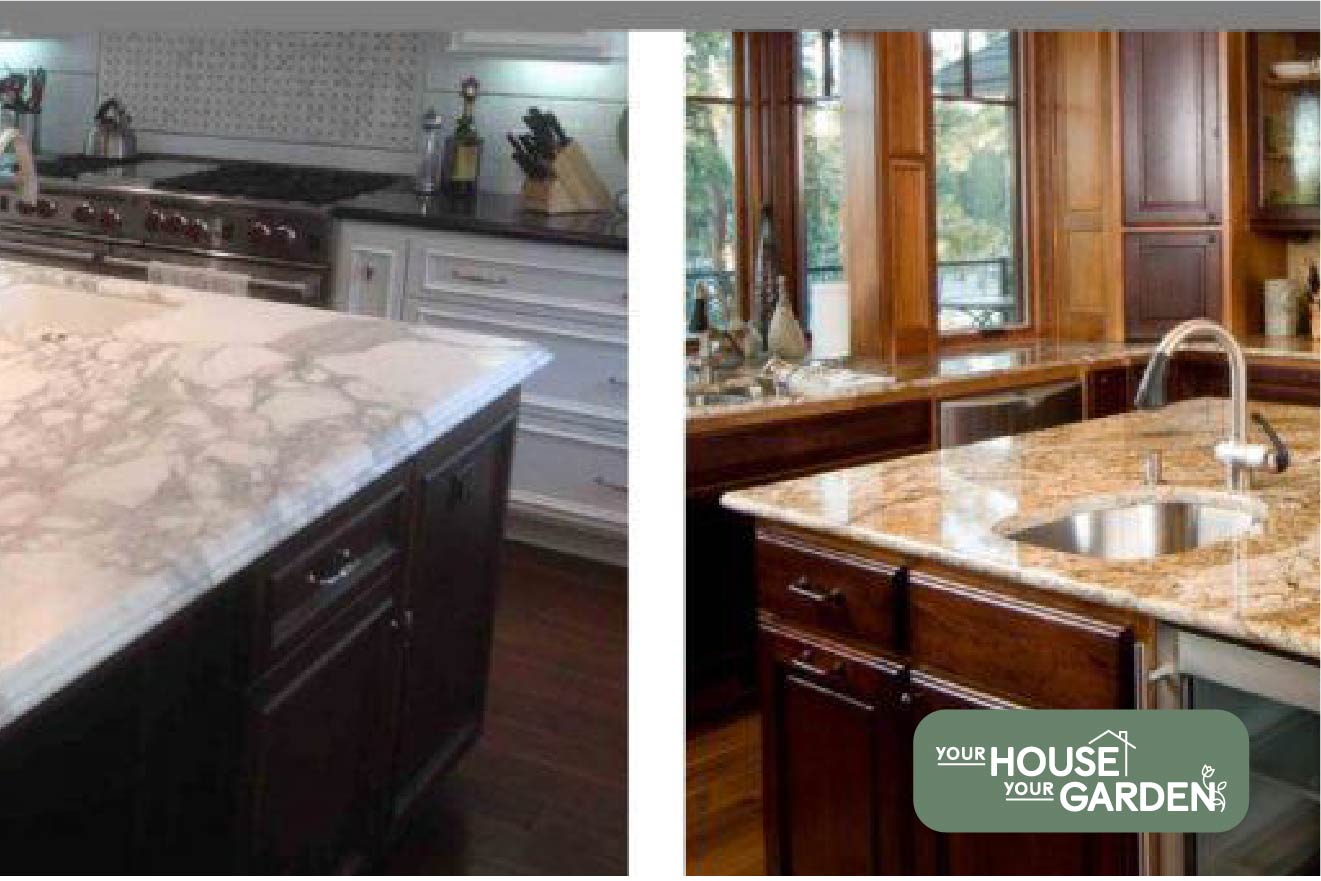
Pros and Cons
When deciding the ultimate material for countertops, granite vs quartz, there are advantages and drawbacks to keep in mind.
Quartz Countertops: Pros
Easy to Maintain: Having a quartz countertop means that you have a non-porous surface that does not require any special sealant to stay germ-free. This engineered stone is also great for countertops because of its resistance to staining. When liquids are spilled, mild soap and water are all you need for a clean countertop.
Durable: A quartz countertop is also known for its durability. With proper maintenance, engineered quartz can withstand busy kitchens and can withstand chipping, scratching, and staining.
Versatile: As an engineered stone, the crushed quartz that is mined and mixed into a slab results in different colors and finishes. Similar to laminate, quartz countertops are extremely versatile and can be bought in a color that compliments any interior design style. Unlike natural stone, engineered stone can also mimic other countertop materials like marble, concrete, granite, or wood.
Quartz Countertops: Cons
Price Point: All of the benefits of having a quartz countertop comes with a price. Quartz is pricier than other countertop materials and will cost you $60 per square foot installed depending on its manufacturer, quality, design, finish, and edge profile.
Appearance: In the same way quartz can be praised for its versatility as an engineered stone, it can also be considered a drawback. Quartz countertops are not unique and do not have the same charm and aesthetic that natural materials do. Additionally, with set designs and patterns, it is more difficult to hide seams in between slabs where a natural stone can be matched with other slabs with different patterns.
Not Resistant to Extreme Temperatures: Quartz, the stone itself is quite resistant to heat, however, the resin mixed into quartz countertops is not. When hot pans are removed from the stove and placed on a quartz countertop, there will be scorch marks. Additionally, cracks will start to show when quartz countertops are subject to temperatures of 300°F (149°C.)
Granite Countertops: Pros
Easy to Take Care Of: Granite countertops are also easy to maintain. To restore a granite countertop’s polished look, simply use a household cleaner and cloth to wipe off crumbs or spilled liquids.
Long-lasting: After sealing, this natural stone can last at least 30 years. Granite countertops are resistant to heat, moisture, bacteria, and stains which means that they can be the focal point of a kitchen for years.
Valuable: High-end granite countertops are timeless and luxurious which are just two of the reasons to invest in this natural stone. Like other stone countertops, each granite countertop is unique and can increase the value of your home if you are planning on renting or selling your space in the future.
Repairable: Granite countertops are infinitely repairable. While this natural stone does not scratch or chip easily after professional or DIY installation, accidents do happen. Fortunately, manufacturers and maintenance professionals offer repair services when granite countertops take on extreme heat stress, are chipped, have failing seams, or are cracked.
Eco-friendly: Compared to other countertop materials, granite has low levels of volatile organic compounds (VOCs) and does not emit radiation or harmful gasses. This natural stone countertop can also last a lifetime which means that you will not need to replace your countertops any time soon.
Aesthetic: Like other natural materials, stone countertops like granite are renowned for their beauty. Every square foot of granite is unique and there’s something charming about having to match slabs with similar color profiles but different patterns.
Granite Countertops: Cons
Sealing Required: This particular stone material requires sealant every 6 months to 3 years depending on how often you spill or drop items on countertops. Some may find this maintenance tiresome and will opt for another material for their countertops instead.
Weight: Granite countertops are quite heavy which means that they require extra support per square foot installed.
Busy: Also granite, as a stone, naturally has different veining patterns and color combinations that some may find too busy as compared to a material like laminate. Granite can be overwhelming.

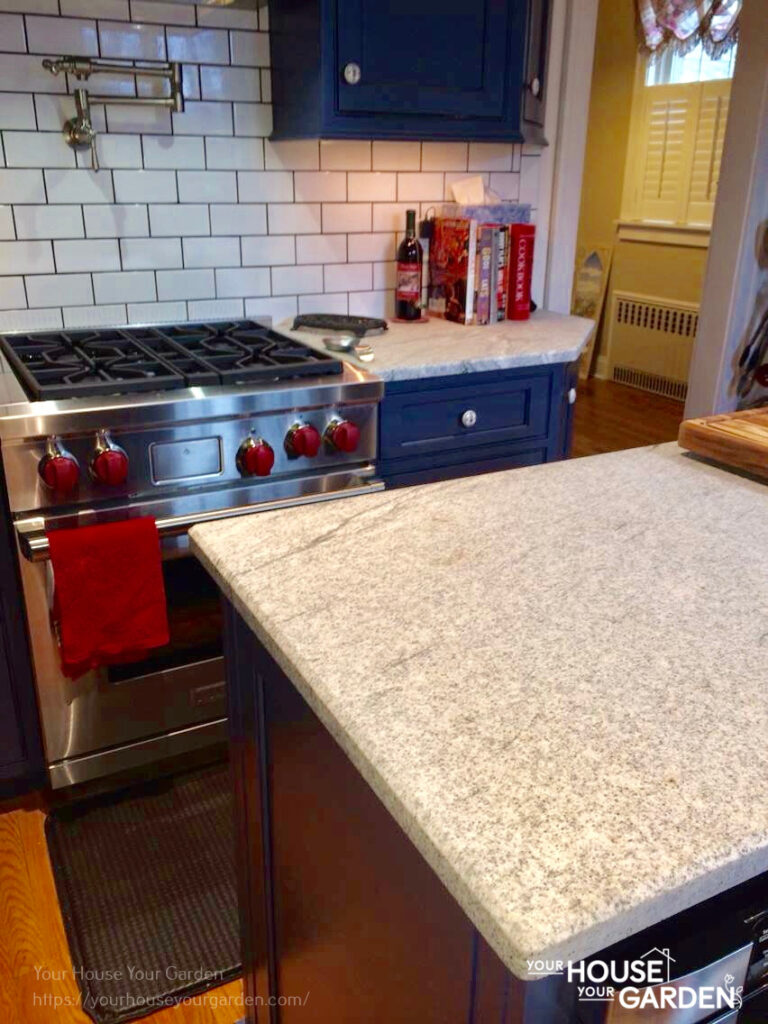
Comparing the Two
When deciding between granite or quartz countertops, here’s a side by side comparison:
Appearance
While both granite and quartz countertops have their charms based on their appearance, granite vs quartz, the former definitely gets more points for uniqueness. Since quartz countertops are engineered, they are more uniform in appearance. For homeowners up to the challenge of mixing and matching granite stone slabs, granite is the way to go.
Composition
Both granite and quartz countertops have bits and pieces of quartz, but quartz countertops are made up of so much more. Granite stone is sourced from stone queries where it is cut, polished, and fabricated while quartz countertops require resin.
Maintenance and Repairs
When you buy a quartz or granite countertop, there will be some level of maintenance required and repairs when extensive damage occurs. However, quartz vs granite countertops, quartz does not require any sealing because of the resins used in it fabrication. A quartz slab is also uniform throughout so it is less prone to cracking.
On the other hand, granite slabs require sealing prior to installation and later on every so often for maintenance. As a natural stone, granite may also have flaws that make the countertop material more prone to cracking.
In terms of repairs, granite vs quartz, granite is more repairable. Due to its composition, quartz will need replacement if the material is scorched while granite is repairable.
Durability
Quartz and granite are known for their durability. However, comparing granite and quartz, granite will last at least 30 years while quartz will last up to 10 years.
Sustainability
Quartz and granite are both sustainable choices, but as granite is 100% natural and has a longer lifespan, it may be considered the better choice. This is debatable because granite needs to be quarried while quartz is composed of stone byproducts.
Installation
Both countertop materials are better suited for professional installation. Quartz and granite are heavy materials and are costly which means that you do not want to be dropping and cracking these countertops. For the installation phase of kitchen remodeling or renovation, leave it to the professionals.
Cost
While the cost of both countertop materials depends on their source, size, thickness, pattern, edge profile, etc., quartz slabs are generally more affordable. As a completely natural stone, granite has a slightly higher price point because of each unique slab.
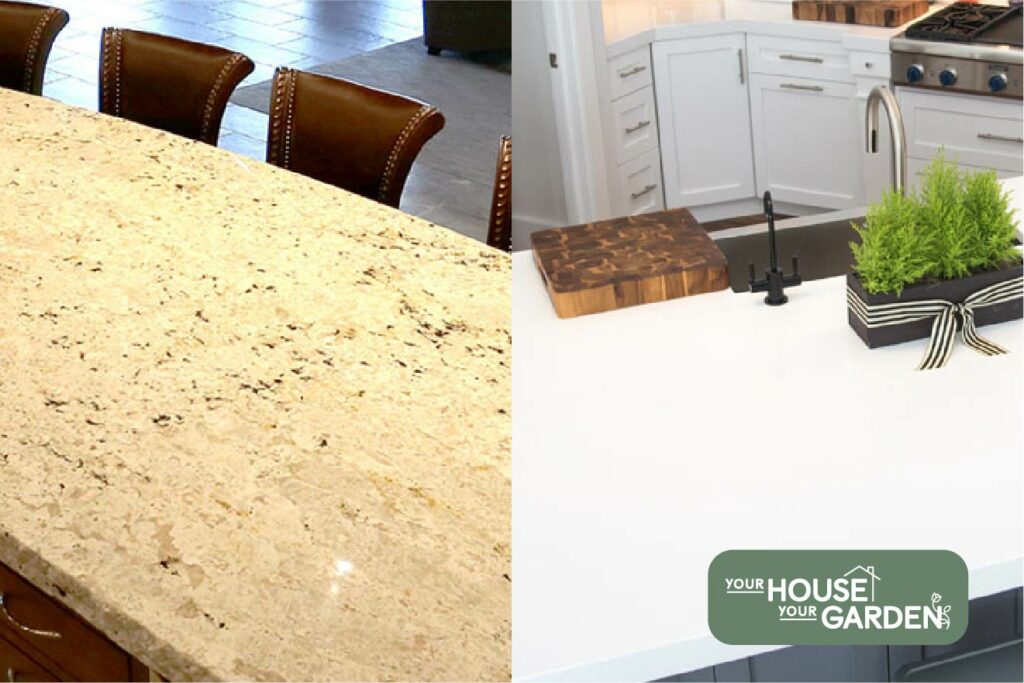
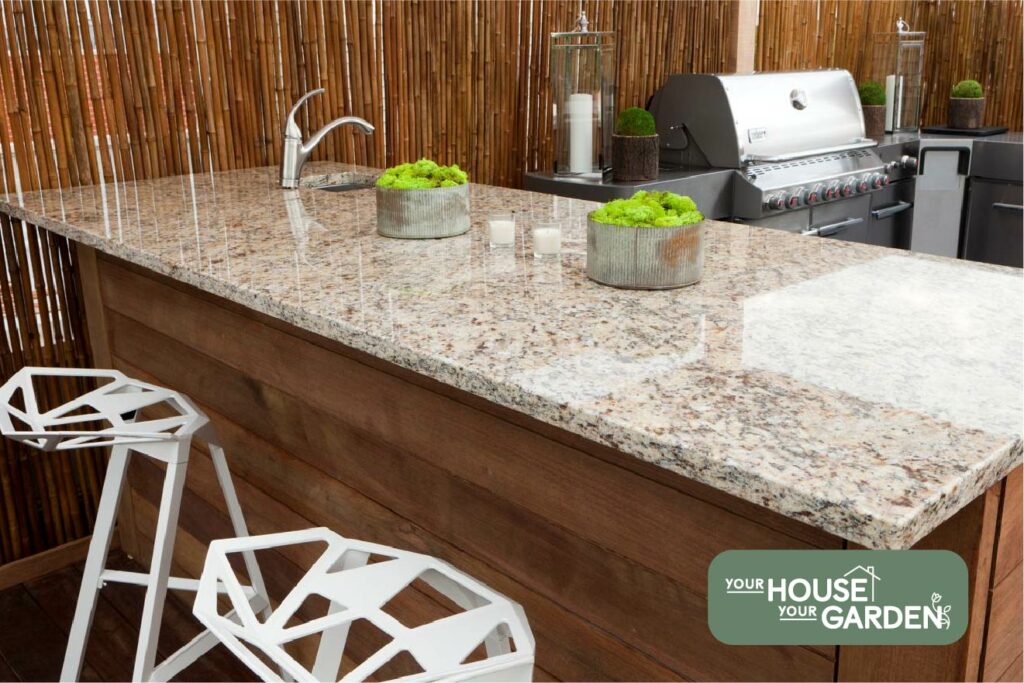
FAQs: Quartz vs Granite Countertops
Which is better: quartz or granite countertops?
Both are excellent choices. The “better” option for your counters depends on what you are looking for.
For those who prefer a more natural and unique option for their interior design, granite is the better choice. For those looking for a more affordable, aesthetic, and low-maintenance material, quartz could be more beneficial.
Which is more expensive: granite or quartz?
Granite is more expensive than quartz. This is because it is quarried and each countertop made out of the material is one of a kind. While quartz will cost $60 per square foot, granite will cost anywhere from $40 to $100 per square foot.
Do granite or quartz countertops scratch more easily?
As a natural stone, granite is the countertop material that scratches more easily. While sealing can help prevent scratching, quartz is engineered to be highly resistant to scratches.
